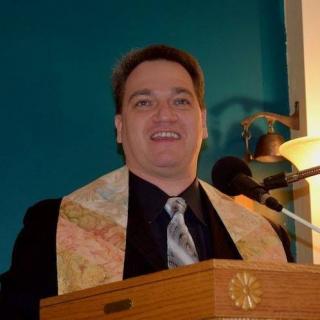What Four Years Has Taught Me
By David Pyle

Rev. David Pyle
For the last four years, I have had the honor of serving the congregations of the Central East Region of the UUA, first as the District Executive of the Joseph Priestley District, and then as a Primary Contact and as a specialist in governance, staffing, ministry, and pastoral care. I remember when I accepted the position, the Central East Region had been mostly a dream and an agreement to share a few staff between the four districts, and now it is a fully functioning staff team, and a growing set of wider relationships among congregations. While the Central East Region is still growing and adapting, it is wonderful to see the ways in which what was once an idea has been “made manifest”.
As I am preparing to step away from serving on the Central East Regional staff for a year, to serve our country as a U.S. Army Reserve Chaplain during a deployment, I have been thinking about what these four years has taught me. It is a little different than when I have departed from previous ministries, because I will be returning to the UUA staff when my active duty obligation is complete. What I have been thinking about these last few weeks has been the learnings that I will continue to live into when I return.
The first and largest of these is the realization that there are no two Unitarian Universalist congregations that are the same.
We can intellectually say that every congregation is a unique expression of our living faith tradition, but I think serving in the role of the Regional Staff is one of the few ways to really see that truth. Every congregation makes decisions in a different way. Every congregation understands its core beliefs in a different way. Every congregation sees its purpose differently. Every congregation has a different relationship between its leadership and ordained ministry. Every congregation does faith formation differently. Every congregation has different joys and pains in its history, which lead to different assumptions and challenges.
As a consultant, I think I first thought that we should try to make our congregations more like one another. As if there was one “right” way, or “best practice” that would work in all the varying congregations, cultures, and contexts of our free faith. The arc of my development on this led me later to think that such commonality would be beneficial, but it might be impossible to ever actually occur.
What working with the wonderful and dedicated leaders of our congregations has taught me is that the strength and beauty of our religious movement lies in just how different all of our congregations are. And that very few people are in a position to see that strength and beauty the way that members of your Regional Staff do.
The passion I think I will return to is how to help those serving in the leadership of a congregation to see the strength and beauty of their own congregation. To see and celebrate its uniqueness. To own the history and culture that create their congregation’s identity in such a way that inspires them to be the best of both.
To stop thinking of the differences in our congregations as something that “needs to be fixed”.
And… to begin to see the strength and beauty in other Unitarian Universalist congregations as well… not to copy them or even to learn from them, although learning might happen. No, I want all of you to see the ways in which our differences make for who we are as a movement of liberal faith.
I look forward to seeing you all when I return, and to continue to be amazed by your dedication and love for one another. Thank you for allowing me to journey with you these last four years, and I look forward to catching back up to you on this path.
Yours in Faith,
Rev. David Pyle
Note: Paula Cole-Jones will be filling in this next year for Rev. Pyle starting on August 13th.

